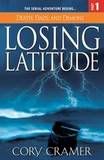 Part 1: "Death, Dads and Demons"
Part 1: "Death, Dads and Demons"
Part 2: "The Past Comes Back To Haunt Us"
Part 3: "Goodbyes and Getaways"
Part 4: "The Last Place To Run"
Part 5: "Revelations"
Remarco Publishing / 2006-2008
Reviewed by: Blu Gilliand
In 1996, Stephen King breathed new life into a literary gimmick lost to the days of Dickens – the serial novel. While King’s six-part novel The Green Mile was a success, the reading public’s fascination with the experiment didn’t linger after the final installment hit the stands. A few half-hearted attempts to capitalize on King’s success followed, but for the most part the format retreated into obscurity.
Beginning in 2005, Losing Latitude author Cory Cramer tried once again to revitalize the format with his self-published five-part story of murder, mystery, artifacts and demons. Unfortunately, while the elements for a good yarn are in place, Cramer doesn’t quite have the grasp of pacing and storytelling needed to pull it off.
The story begins on a strong enough note. 17-year-old Lilly North lives on a boat with her parents. The family has spent the last ten years sailing from one exotic port to the next, pursuing evidence to support Brady North’s esoteric theories about ancient civilizations and aliens – theories that cost him a high-profile gig as a Berkeley professor. When a storm at sea brings their adventure to a tragic end, Lilly is left stranded at a military hospital in Cuba with no family and no friends – nothing to her name but a handwritten journal salvaged from the boat and a cool million in the bank.
As Lilly recuperates and tries to piece together the true nature of her father’s quest, she starts reading the journal, which belongs to a young man named Buck McGee. McGee is on the run – his father is dead, and Buck may have killed him. Plus, there’s a man on his trail, a man that Buck believes is actually a demon responsible for his father’s death.
So here we have the ingredients for a good adventure novel, ripe with cliffhanger possibilities. We’ve got two characters in completely different situations – but we know their stories have to eventually come together. We’ve got questions galore about how the two are connected, and how the ripples from one story are going to cross over into the other.
The setup is good. Unfortunately, the execution is not.
For us to really get involved, we have to believe in Lilly and Buck as characters. Cramer’s decision to tell Buck’s story solely through his journal entries seems like a perfect choice, one that would allow us an intimate look at both the events Buck is describing and at Buck himself. However, Cramer fails to distinguish Buck’s voice from that of the rest of the book. The journal entries read exactly the same as Lilly’s narrative, with only their presentation in a faux-handwriting font providing any sort of distinction.
As for Lilly, her story moves far too slowly to maintain interest. For the majority of the first three books in this series, Lilly is in her hospital room, reading Buck’s journal. Because Cramer has to keep her - as one of the book’s main characters - high in readers’ minds, he checks in on her quite frequently. Unfortunately, rather than moving her story forward, we’re treated to long passages about the boredom of being in a hospital and the inadequacies of the hospital’s shower facilities. There’s a bland attempt at romance with one of the male nurses, but otherwise Lilly spends much of the time just reading. Her story does finally kick-start later in the series, but at that point it’s too little, too late.
Cramer, who admits on his website that he began writing Losing Latitude because writing a book sounded more desirable than getting a “real job,” simply doesn’t have the chops to pull off a story as ambitious as he set out to write. There are some good ideas and a lot of potential in the plot Cramer sets forth, but nothing really gets off the ground. Many of the passages are clunky and uninspired, and the sense of excitement and tension that is so vital to this genre is almost completely absent.
As noted above, Cramer chose to go the independent route with Losing Latitude, a decision made (according to his website) without having sent the manuscript to a single agent or publisher. The lack of professional editing really shows in the book’s long, meandering passages and generic voice. If Cramer hopes to grow and succeed as a writer, he needs to think seriously about opening up his work to the critique and polishing of professionals.
Purchase Cory Cramer's Losing Latitude series.